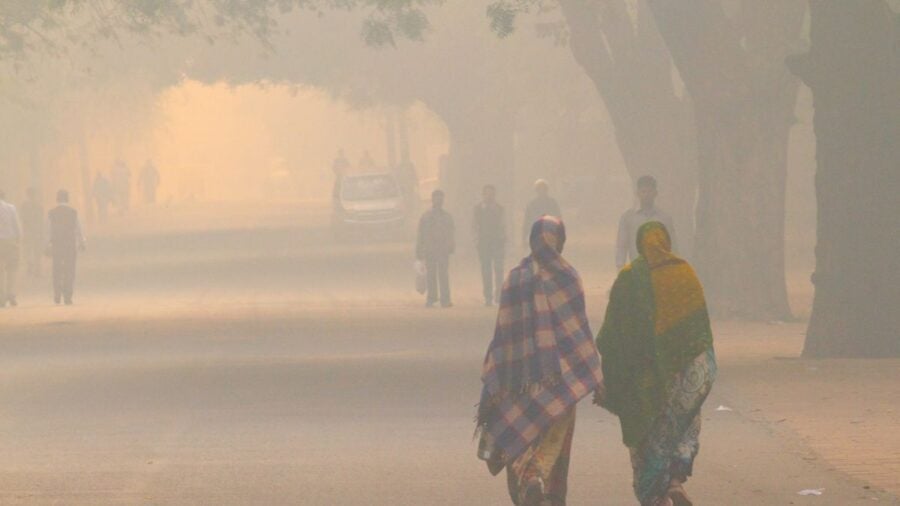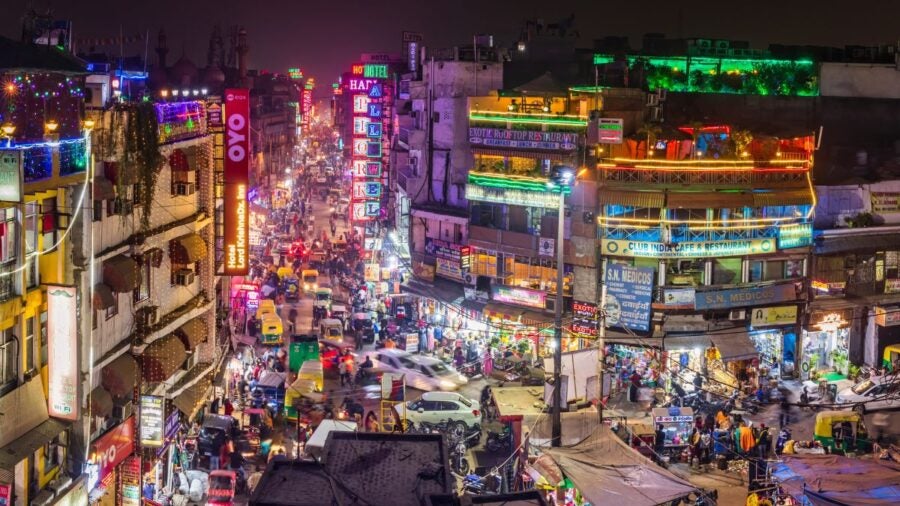
India has the world’s fifth-largest economy and it’s closing in fast on the nations above it on that list. The country’s solid GDP growth – forecast to hit 6.3% next year – has been helping to attract foreign investment, businesses and workers, particularly to New Delhi.
The capital has become a popular destination for westerners seeking to further their careers in India. Plentiful opportunities exist here and the language barrier is low for English speakers. Boasting a rich cultural heritage and a whole host of culinary options, New Delhi also offers a wide range of experiences even for those familiar with the territory.
What to know before you go
Arriving in New Delhi can feel like an “assault on the senses”, especially if it’s your first visit, warns Amair Farooqui, a French attorney who has lived here for nine years and served as legal counsel to the French embassy since 2017. He recommends that newcomers allow themselves at least six months to settle in.

It takes the average expat worker in India 7.4 months to feel fully acclimatised, according to a survey by HSBC. While that might seem like a long time, it actually compares favourably with the global average of 8.3 months.
English is widely spoken in the city, which can make assimilation a much smoother process for anglophones. Also aiding the adjustment is the welcoming culture. Nearly three-quarters (72%) of expats surveyed by InterNations in 2019 rated the general friendliness of the Indian population positively.
Nonetheless, some aspects of the New Delhi experience can take some adjusting to. Air pollution is a serious problem, for instance. More than 80% of expats gave the city a low environmental rating in the InterNations poll.
“Pollution is definitely a big red flag,” Farooqui says. “I’ve seen people declining job offers for that reason, but you learn how to dodge the very worst of it. During Diwali, for instance, most people will fly back to their home countries or take a holiday outside the city.”
The wider metropolitan area of Delhi (with a UN-estimated population of 33 million) has also earned the unwanted reputation of being India’s least safe city for women. It saw a 40% year-on-year increase in the number of reported crimes against women in 2021, with the National Crime Records Bureau recording nearly 14,000 incidents that year alone.
What visas and permits do you require to work in New Delhi?
To work in India, you’ll need an employment visa and a work permit. The visas are generally issued for up to 12 months, although these can be extended to five years. To qualify, you’d need to be earning at least $25,000 (£20,500) annually. Exceptions can be made for people in certain occupations, including foreign-language teachers and translators.
Arriving in Delhi can feel like an assault on the senses
Most people working in senior roles will easily meet these requirements. According to the MyExpatriate Market Pay Survey, the average expat middle manager in India is on a reward package worth $330,000 (£270,000). This includes the cost of healthcare, education and housing.
The industries where you’re most likely to find employment as an international worker in India are agriculture, automotive, construction, oil and pharmaceuticals. The biggest employers of expats include Axis Bank, Boeing, Maruti Suzuki, Reliance Industries and Tata Group.
A family-friendly city
New Delhi stands out as a family-friendly city compared with many other popular destinations. Most expats enrol their children in international or private schools. Since the fees these institutions charge can be relatively high, many employees moving to India will receive an allowance as part of their package.
The most popular international schools in New Delhi are the American Embassy School, the British School and Lycée Français International de Delhi. With abundant cultural and sporting facilities, the city offers a wide range of activities for kids. Many expats with children tend to find participating in their school events a useful way to settle in here.
It’s important to note that some local landlords are hesitant to accept foreign nationals as tenants, while a significant proportion will refuse to let property to couples who aren’t married.
New Delhi’s working culture
Your working life in the capital can vary considerably depending on your employer, notes Rocío Pérez Hernández, a Spanish design consultant and entrepreneur. She reports that there have been huge differences among the workplaces she’s experienced in New Delhi over the past nine years.
These have ranged from “well-structured and highly functional offices with a good atmosphere to extremely chaotic places that were quite unprofessional”, she says. “I’m now a consultant for a firm that’s managed by incredibly talented women. It’s been the best professional experience I’ve had here so far.”

Pérez Hernández adds that, despite the disorganised workplaces she endured, her transition to Indian working life was surprisingly easy.
“I think I was mentally prepared for it,” she recalls. “I didn’t have high expectations about a new and comfortable lifestyle, so I went with the flow.”
Farooqui credits his colleagues with helping him to understand the country and its culture. When he first arrived in New Delhi, he spent much of his free time hosting lunches and dinners to get to know as many new people as possible.
“Lunchtime is a really special moment for every Indian,” he says. “Be ready to share your meal – people generally aren’t shy and will happily pick straight from your plate and offer you food in return. They will often invite you to eat with them.”
Farooqui adds: “Don’t hesitate to ask others if they’d like to join you on a trip to explore a new place. You’ll be surprised at how many people will want to come with you.”
India’s poor work/life balance
Some westerners will find the general work/life balance in India – or lack thereof – difficult. Research has found that full-time expats in India work an average of 47.7 hours a week, compared with a global mean of 43.9 hours.
“In my experience, the longer working hours are down to India’s time-zone differences with American and European countries.”
So says Juan Cobos Hernández, a Spaniard who spent 18 months in Delhi as the regional head of an engineering and project management consultancy. He adds that many public sector organisations still operate six-day weeks, warning that, “if a supplier or client is working on a Saturday, you might receive a call that day that you’d need to answer”.
Don’t hesitate to ask others if they’d like to join you on a trip to explore a new place
On the whole, most expats rate their experience here positively, especially given the luxuries it affords them.
“I’ve always had the idea that you really must try to integrate yourself with the locals, especially like-minded ones, if you want to make a life in India,” Cobos Hernández says.
As long as India keeps providing its enticing mix of economic opportunity and cultural vibrancy, any westerner seeking to develop their career here would do well to explore what its lively capital city can offer them.

India has the world’s fifth-largest economy and it’s closing in fast on the nations above it on that list. The country’s solid GDP growth – forecast to hit 6.3% next year – has been helping to attract foreign investment, businesses and workers, particularly to New Delhi.
The capital has become a popular destination for westerners seeking to further their careers in India. Plentiful opportunities exist here and the language barrier is low for English speakers. Boasting a rich cultural heritage and a whole host of culinary options, New Delhi also offers a wide range of experiences even for those familiar with the territory.

